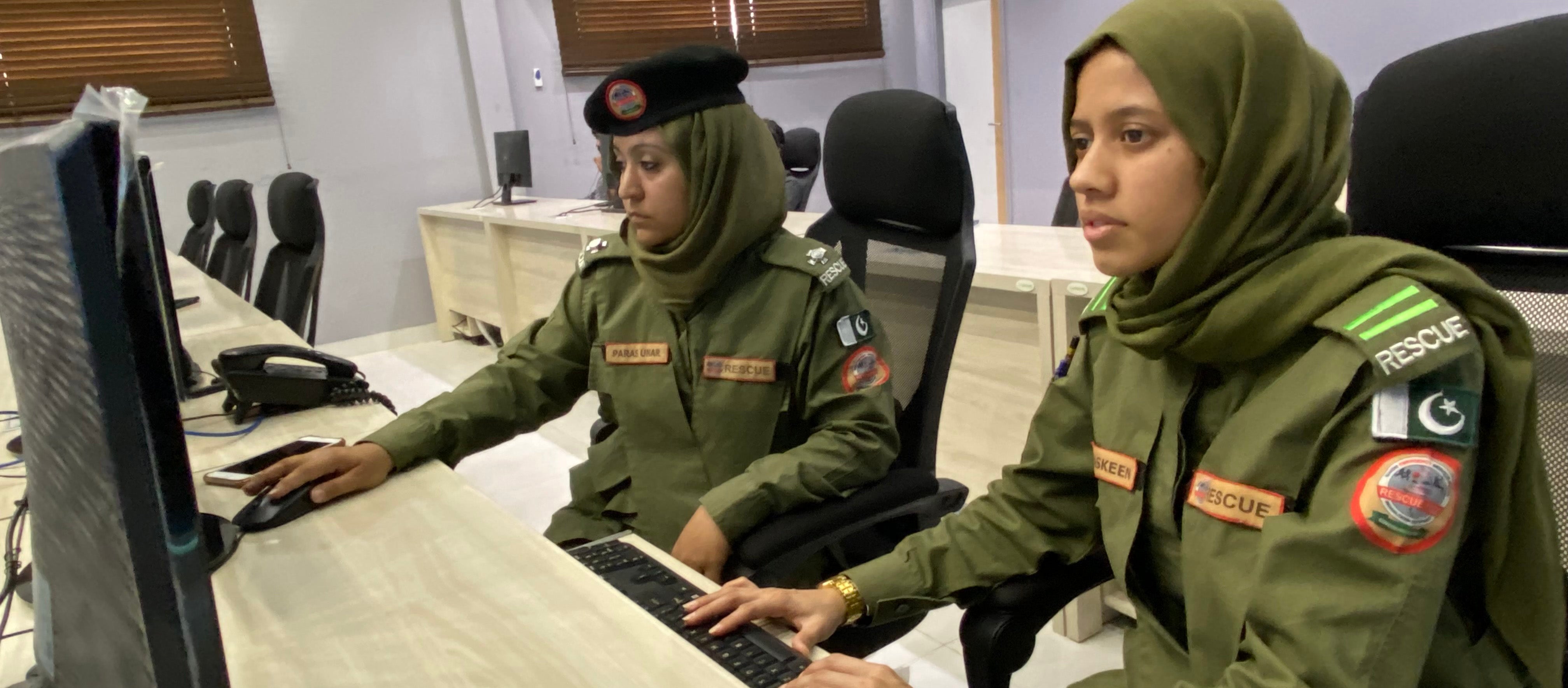 Paras and Taskeen at the newly established Emergency Operations Center in Karachi.
Paras and Taskeen at the newly established Emergency Operations Center in Karachi.
Paras Unar, and Taskeen Zaidi, were the first women hired for the Sindh Emergency Rescue Service 1122 under the World Bank supported Sindh Resilience Project. Rescue 1122, established in March 2022, is a one-window comprehensive emergency service – the first of its kind in Sindh province. By calling the free “1122” helpline, citizens are able to access emergency services such as long-distance medical transfers, accident response, firefighting, water rescue, urban search and rescue, and law and order support.
“Most people around me believed that a woman could not do a job in rescue operations. But I thought to myself, 'why not a woman?' and went on to take it as a challenge,” Paras proudly explains.
Training of rescue staff was instrumental in operationalizing services and inculcating a deep commitment to serve. In a batch of 134 officers, Paras and Taskeen were selected to embark on a four-month training at the rescue academy located in Lahore, Pakistan. The training consisted of completing physical drills, mastering rescue techniques, and developing psychological and technical skills required in disaster response.
Paras and Taskeen recount the training as strenuous. “We would wake up before sunrise and train for tough situations, like jumping from a high building. Most people thought the training was too difficult for women and expected us to quit. It was our passion to serve humanity as women rescue officers, and that gave us strength to overcome the obstacles.”
photo
Paras commutes for three hours daily to the Rescue 1122 headquarters, where she manages rescue inventory and deploys equipment during emergencies. She is especially proud that her two sons have developed a sense of responsibility for public service. “After the birth of my second child, I was going through post-partum depression. That was when my brother mentioned applying for a job with Rescue 1122 Sindh,” Paras reflects.
The road is not an easy one. Only 21 percent of working age women are employed – this is far lower compared to countries at a similar level of development, which average 58 percent.
Barriers for women to work in Pakistan include mobility limitations, safety concerns, and social norms around housework and childcare. Sexual harassment on the way to and in the workplace, is another constraint. Women are also more likely to participate in the labor force if men in the household agree that women should be allowed to work outside the home. Research shows that investment in safe and affordable transport for women, internet access, interventions aimed to reduce family objections, childcare support facilities, and reduction of gender bias in recruitment, are key to enable women’s participation in the workforce.
Taskeen, who now manages emergency calls as a control room operator, learned about the Rescue 1122 job opportunity on the internet. People discouraged her from applying for this position terming it inappropriate for women. Another challenge was to travel to Lahore, a city in another province across the country, for the training. However, Taskeen’s family, particularly her husband, were supportive and attended to her young son while she trained in Lahore. The support of colleagues and mentorship of the rescue director were instrumental.
“I wanted to prove that not only could a woman work but she could perform valuable service for her community. Today, I am proud to be a part of Sindh's rescue team. I have shown that women can play their part in building an institution and do important work. I truly believe that my choice of working for the rescue service is a step to change the future of our young girls, who are reluctant to join the service only because they think these jobs are for men”.
Since deployment, Taskeen has managed over 250 emergency life-saving calls.
To further strengthen disaster management services in the context of climate change, the Government of Sindh is scaling up the emergency service under the World Bank-funded Sindh Flood Emergency Rehabilitation Project to expand from the current seven districts to sixteen districts across Sindh.
Disasters and climate change disproportionately impact women and girls. Understanding the different needs and experiences of women and girls is critical – therefore, Rescue 1122 has a strong focus on recruiting and training women.
“Disasters disproportionately impact women and children - highlighting the need to engage women rescue staff. We are committed to providing ample incentives and support for women, so they can work as frontline rescuers.”” explains Ghulam Asghar Kanasro, Project Director of the Sindh Resilience Project.
Paras and Taskeen’s journey will inspire countless women in Pakistan to challenge social structures, empower themselves and others, and create an inclusive rescue service for the country.
Click here to read in Sindhi.




Join the Conversation